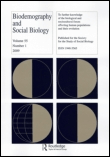
Biodemography and Social Biology
metrics 2024
Pioneering Research at the Intersection of Biology and Anthropology
Introduction
Biodemography and Social Biology is a distinguished academic journal published by Routledge Journals, Taylor & Francis Ltd, focusing on the intersections of demographic and biological sciences. With its ISSN 1948-5565 and E-ISSN 1948-5573, this journal contributes significantly to the fields of anthropology, demography, and social biology, making it an essential resource for researchers and professionals alike. The journal has consistently achieved high rankings, notably placing in Q2 in both anthropology and demography, underlining its impact in these critical areas of study. Although it does not provide Open Access options, the journal's rigorous peer-review process ensures the highest quality of academic discourse and research dissemination. Covering a wide scope of topics related to human population dynamics, health, and behavior, Biodemography and Social Biology serves as a vital platform for advancing knowledge and understanding of the biological and social factors influencing human societies since its inception in 1990. Researchers, students, and professionals are invited to contribute their findings and insights, enriching the academic conversation that this journal fosters.
Metrics 2024
 0.36
0.36 0.90
0.90 1.20
1.20 36
36Metrics History
Rank 2024
Scopus
IF (Web Of Science)
JCI (Web Of Science)
Quartile History
Similar Journals

Comparative Population Studies
Fostering dialogue through comparative demographic research.Comparative Population Studies is an esteemed open-access journal published by the BUNDESINSTITUT BEVOELKERUNGSFORSCHUNG in Germany, dedicated to advancing the field of demography. Since its launch and transition to open access in 2010, the journal has provided a platform for researchers to share innovative population studies, promoting a deeper understanding of demographic trends and patterns globally. With an impressive Q2 rank in Demography within the 2023 quartile categories and a commendable rank #61 out of 139 in Scopus' Social Sciences Demography classification, it plays a vital role in disseminating rigorous research. The journal covers a range of topics related to population dynamics, migration, and social implications, making it invaluable to academics, professionals, and students in the field. With an emphasis on comparative studies, Comparative Population Studies not only fosters scholarly dialogue but also enhances policy-making and economic planning. Located at Friedrich-Ebert-Allee 4, Wiesbaden 65185, Germany, the journal continues to be a prominent resource for those eager to engage with the latest demographic research.
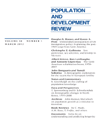
POPULATION AND DEVELOPMENT REVIEW
Advancing Knowledge at the Intersection of Demography and Development.Population and Development Review is a prestigious academic journal published by Wiley, recognized for its comprehensive exploration of the intersections between population dynamics and development processes. Since its inception in 1976, the journal has contributed significantly to the field, featuring rigorous peer-reviewed articles that address pressing issues in demography, development, and sociology, maintaining a commendable reputation with a Q1 ranking across multiple categories as of 2023. With an impact factor that reflects its influence—ranking in the 90th percentile in Sociology and Political Science, and 85th percentile in Development—this journal serves as a vital resource for researchers, policy-makers, and students alike. It is instrumental in fostering dialogue and disseminating knowledge that shapes and informs public policy and academic inquiry. Although not an open-access publication, it remains accessible through various academic institutions, ensuring that its valuable insights are available to a broad audience eager to engage with the complexities of population and development.
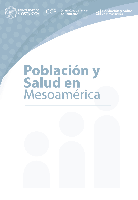
Poblacion y Salud en Mesoamerica
Exploring Population Trends for a Healthier TomorrowPoblacion y Salud en Mesoamerica is a pivotal open-access journal published by the University of Costa Rica's Centro Centroamericano Poblacion. With an ISSN of 1659-0201 and an E-ISSN of the same, this journal has been dedicated since 2003 to advancing the fields of demography, epidemiology, health informatics, and public health within the Mesoamerican region. Addressing critical health and population issues, it aims to foster a deeper understanding of demographic trends and their implications on health policies. As of 2023, the journal ranks in the Q4 quartile across several categories, reflecting its commitment to publishing quality research while serving as a platform for emerging scholars and seasoned professionals alike. Although it is currently in the lower quartile ranks, the journal seeks to establish itself as a vital resource in the context of Mesoamerican social sciences and health, making it an essential tool for researchers and practitioners interested in regional population health dynamics. Its editorial board is comprised of experts dedicated to enhancing the scholarly conversation surrounding population health and policy in Central America.

Demografie
Fostering knowledge on the evolution of populations worldwide.Demografie is a distinguished academic journal published by the Cesky Statistical Office in the Czech Republic, serving as a vital platform for scholars and practitioners interested in the multifaceted field of demography. Established in 1976 and consistently contributing until 1999, with a renewed focus from 2014 to 2024, this journal engages with critical issues such as population dynamics, migration patterns, and socio-economic factors influencing demographic changes. For its impactful research contributions, it holds a Q3 category ranking in Demography for 2023, with a Scopus rank of #89 out of 139 in the Social Sciences category, reflecting its credibility and relevance in the field. Although it operates under traditional access, its insightful articles and comprehensive analyses remain valuable resources for researchers, professionals, and students eager to deepen their understanding of demographic trends and policies. The journal's commitment to advancing demographic knowledge makes it an essential read for those navigating the complexities of population studies.
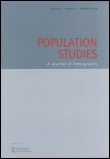
POPULATION STUDIES-A JOURNAL OF DEMOGRAPHY
Illuminating the Past to Understand Population FuturesPopulation Studies: A Journal of Demography is an esteemed scholarly publication dedicated to advancing the understanding of demographic trends and their historical contexts. Published by Routledge Journals, Taylor & Francis Ltd, this journal has a notable impact in its field, recognized as a Q1 category journal in both Demography and History as of 2023. Its Scopus rankings highlight its significance, featuring a remarkable 12th place rank in Arts and Humanities—History and 19th place in Social Sciences—Demography, both underscoring its influential role in academic research. Established in 1947, the journal has consistently contributed to the discourse in population studies, offering a platform for innovative research and critical analysis. While it does not provide open access options, it remains a vital resource for researchers, professionals, and students who seek to explore the complex relationships between population dynamics and historical narratives. Its comprehensive coverage from 1947 to 2024 ensures a rich repository of knowledge, making it essential for anyone involved in demographic research.
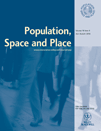
Population Space and Place
Bridging Research and Real-World ApplicationsPopulation Space and Place is an esteemed academic journal published by WILEY, dedicated to advancing the fields of demography and geography, planning, and development. With an impressive 2023 impact factor and categorized in the top quartile (Q1) for both demography and geography, this journal serves as a vital platform for researchers, professionals, and students seeking to explore the spatial dimensions of population dynamics. Founded in 2004 and running through 2024, it has established itself as a significant contributor to scholarly discussions, evidenced by its high Scopus rankings, including rank #18 out of 139 in demography and #165 out of 821 in geography and planning. While the journal currently does not offer open access, it remains a key resource for those involved in academic research and policy formulation. With its focus on the interplay between population trends and spatial analytics, Population Space and Place is essential for anyone aiming to understand the complexities of population geography in a rapidly changing world.

Spatial Demography
Advancing Insights through Spatial AnalysisSpatial Demography is a vital academic journal published by Springer International Publishing AG, focusing on the intersection of spatial analysis and demographic research. With its ISSN 2364-2289 and E-ISSN 2164-7070, this journal aims to advance understanding of population dynamics through innovative methodologies and spatially explicit data, offering a platform for researchers, professionals, and students engaged in demography, geography, and urban studies. While it does not currently operate under an open access model, Spatial Demography maintains a rigorous peer-review process to ensure high-quality publications that contribute significantly to the field. Given the growing importance of spatial data in demographic research, the journal serves as an essential resource for those looking to explore how spatial attributes influence demographic processes and patterns worldwide. The official address of the publisher is Gewerbestrasse 11, Cham CH-6330, Switzerland.

Population Review
Navigating the Complexities of DemographyPopulation Review, published by Sociological Demography Press, is a vital resource in the field of demography, contributing to the understanding of population dynamics and trends since its inception in 1988. With an ISSN of 1549-0955 and an E-ISSN of the same number, the journal has played a significant role in disseminating scholarly research and analysis relevant to demographic changes and their implications. Although currently categorized in the Q4 quartile, it ranks 78th out of 139 in the Scopus Social Sciences: Demography category, placing it within the 44th percentile among its peers. This journal serves as a platform for researchers, professionals, and students to engage with contemporary population issues, encouraging the exploration of new theories and methodologies. While not available as open access, its robust editorial standards and commitment to rigorous research make it an invaluable addition to the libraries of demographers and social scientists alike.

Espaces-Populations-Societes
Connecting Spatial Analysis with Societal DevelopmentEspaces-Populations-Sociétés is a distinguished journal published by UNIV LILLE I SCI & TECH, focusing on the fields of demography and geography. Established in 1983, this open-access journal has committed itself to providing a platform for innovative research and discussions around population dynamics and spatial organization, with accessibility to its content available since 2004. Based in France, at the UFR Géographie & Aménagement, the journal plays a crucial role in advancing understanding of demographic trends and planning developments. With current Scopus rankings highlighting its position in the 25th and 14th percentiles for Demography and Geography, Planning and Development respectively, it maintains a reputable standing within academic circles, establishing its importance in contemporary research landscapes. Researchers, professionals, and students alike will find valuable insights in its comprehensive overview of sociocultural and environmental interactions, as well as place-based issues at the heart of societal development.

Canadian Studies in Population
Pioneering Research in Demography and HistoryCanadian Studies in Population, published by Springer, is a prestigious journal dedicated to advancing the field of demography and the history of population studies within Canada and beyond. With an ISSN of 0380-1489 and an E-ISSN of 1927-629X, this journal has proudly contributed to scholarly discourse since its inception in 1975, and continues to make significant impacts through its rigorous research articles and comprehensive reviews. Recognized for its high academic standards, it boasts a Q2 ranking in Demography and a Q1 ranking in History in 2023, reflecting the journal's critical role in shaping contemporary understanding of demographic trends and historical population developments. With a Scopus rank of #51/139 in Demography and #83/1760 in History, it appeals to a diverse audience including researchers, professionals, and students eager to explore population dynamics, historical context, and societal implications of demographic shifts. While the journal maintains traditional subscription access options, its rigorous peer-reviewed content ensures that it remains a cornerstone for scholars seeking credible and influential insights in their respective fields.